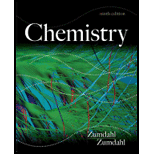
Chemistry
9th Edition
ISBN: 9781133611097
Author: Steven S. Zumdahl
Publisher: Cengage Learning
expand_more
expand_more
format_list_bulleted
Concept explainers
Textbook Question
Chapter 4, Problem 49E
Write the balanced formula and net ionic equation for the reaction that occurs when the contents of the two beakers are added together. What colors represent the spectator ions in each reaction?
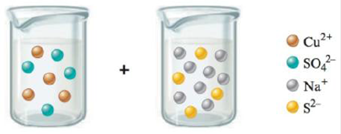
a.
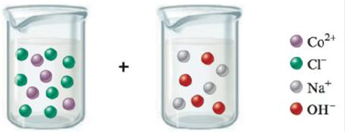
b.
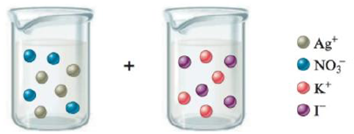
c.
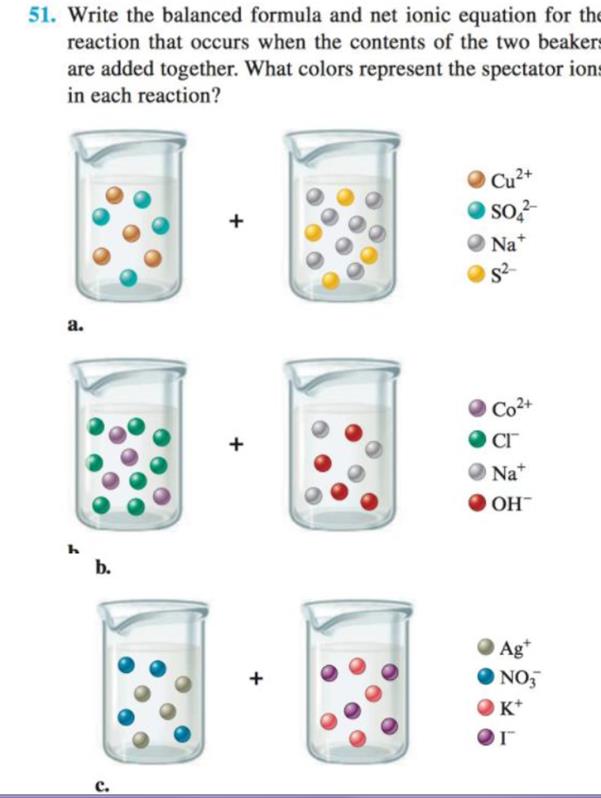
Expert Solution & Answer
Trending nowThis is a popular solution!

Students have asked these similar questions
If we have two compounds: acetone (CH3COCH3)
and acetic acid (CH3COOH); if we apply heat (A),
what product(s) are obtained?
QUESTION: Fill out the answers to the empty green boxes attached in the image.
*Ensure you all incorporate all 27 values (per column)*
You need to make a buffer by dissolving benzoic acid and sodium benzoate in
water. What is the mass of benzoic acid that you would weigh out, in mg, to
create 50 mL of a buffer at pH = 4.7 that will change pH no more than 0.10 units
with the addition of 0.001 moles of acid or base?
Enter just the answer without the units (mg) - just the number will do!
Chapter 4 Solutions
Chemistry
Ch. 4 - The (aq) designation listed after a solute...Ch. 4 - Characterize strong electrolytes versus weak...Ch. 4 - Distinguish between the terms slightly soluble and...Ch. 4 - Molarity is a conversion factor relating moles of...Ch. 4 - What is a dilution? What stays constant in a...Ch. 4 - When the following beakers are mixed, draw a...Ch. 4 - Differentiate between the formula equation, the...Ch. 4 - What is an acid-base reaction? Strong bases are...Ch. 4 - Define the terms oxidation, reduction, oxidizing...Ch. 4 - Prob. 10RQ
Ch. 4 - Assume you have a highly magnified view of a...Ch. 4 - You have a solution of table salt in water. What...Ch. 4 - You have a sugar solution (solution A) with...Ch. 4 - You add an aqueous solution of lead nitrate to an...Ch. 4 - Order the following molecules from lowest to...Ch. 4 - Why is it that when something gains electrons, it...Ch. 4 - Consider separate aqueous solutions of HCl and...Ch. 4 - Prob. 8ALQCh. 4 - Prob. 9ALQCh. 4 - The exposed electrodes of a light bulb are placed...Ch. 4 - Differentiate between what happens when the...Ch. 4 - A typical solution used in general chemistry...Ch. 4 - Prob. 15QCh. 4 - A student wants to prepare 1.00 L of a 1.00-M...Ch. 4 - List the formulas of three soluble bromide salts...Ch. 4 - When 1.0 mole of solid lead nitrate is added to...Ch. 4 - What is an acid and what is a base? An acid-base...Ch. 4 - A student had 1.00 L of a 1.00-M acid solution....Ch. 4 - Differentiate between the following terms. a....Ch. 4 - How does one balance redox reactions by the...Ch. 4 - Prob. 23ECh. 4 - Match each name below with the following...Ch. 4 - Calcium chloride is a strong electrolyte and is...Ch. 4 - Commercial cold packs and hot packs are available...Ch. 4 - Calculate the molarity of each of these solutions....Ch. 4 - A solution of ethanol (C2H5OH) in water is...Ch. 4 - Calculate the concentration of all ions present in...Ch. 4 - Prob. 30ECh. 4 - Prob. 31ECh. 4 - Prob. 32ECh. 4 - Prob. 33ECh. 4 - If 10. g of AgNO3 is available, what volume of...Ch. 4 - A solution is prepared by dissolving 10.8 g...Ch. 4 - A solution was prepared by mixing 50.00 mL of...Ch. 4 - Calculate the sodium ion concentration when 70.0...Ch. 4 - Suppose 50.0 mL of 0.250 M CoCl2 solution is added...Ch. 4 - Prob. 41ECh. 4 - A stock solution containing Mn2+ ions was prepaned...Ch. 4 - On the basis of the general solubility rules given...Ch. 4 - On the basis of the general solubility rules given...Ch. 4 - When the following solutions are mixed together,...Ch. 4 - When the following solutions are mixed together,...Ch. 4 - For the reactions in Exercise 47, write the...Ch. 4 - For the reactions in Exercise 48, write the...Ch. 4 - Write the balanced formula and net ionic equation...Ch. 4 - Give an example how each of the following...Ch. 4 - Write net ionic equations for the reaction, if...Ch. 4 - Write net ionic equations for the reaction, if...Ch. 4 - Separate samples of a solution of an unknown...Ch. 4 - A sample may contain any or all of the following...Ch. 4 - What mass of Na2CrO4 is required to precipitate...Ch. 4 - What volume of 0.100 M Na3PO4 is required to...Ch. 4 - What mass of iron(III) hydroxide precipitate can...Ch. 4 - What mass of silver chloride can be prepared by...Ch. 4 - A 100.0-mL aliquot of 0.200 M aqueous potassium...Ch. 4 - A 1.42-g sample of a pure compound, with formula...Ch. 4 - You are given a 1.50-g mixture of sodium nitrate...Ch. 4 - Write the balanced formula, complete ionic, and...Ch. 4 - Write the balanced formula, complete ionic, and...Ch. 4 - Write the balanced formula equation for the...Ch. 4 - Prob. 68ECh. 4 - What volume of each of the following acids will...Ch. 4 - Prob. 70ECh. 4 - Hydrochloric acid (75.0 mL of 0.250 M) is added to...Ch. 4 - A student mixes four reagents together, thinking...Ch. 4 - A 25.00-mL sample of hydrochloric acid solution...Ch. 4 - A 10.00-mL sample of vinegar, an aqueous solution...Ch. 4 - What volume of 0.0200 M calcium hydroxide is...Ch. 4 - A 30.0-mL sample of an unknown strong base is...Ch. 4 - A student titrates an unknown amount of potassium...Ch. 4 - The concentration of a certain sodium hydroxide...Ch. 4 - Assign oxidation states for all atoms in each of...Ch. 4 - Assign the oxidation state for nitrogen in each of...Ch. 4 - Assign oxidatioo numbers to all the atoms in each...Ch. 4 - Specify which of the following are...Ch. 4 - Specify which of the following equations represent...Ch. 4 - Consider the reaction between sodium metal and...Ch. 4 - Consider the reaction between oxygen (O2) gas and...Ch. 4 - Balance each of the following oxidationreduction...Ch. 4 - Balance each of the following oxidationreduction...Ch. 4 - You wish to prepare 1 L of a 0.02-M potassium...Ch. 4 - The figures below are molecular-level...Ch. 4 - Prob. 91AECh. 4 - Prob. 92AECh. 4 - Using the general solubility rules given in Table...Ch. 4 - Consider a 1.50-g mixture of magnesium nitrate and...Ch. 4 - A 1.00-g sample of an alkaline earth metal...Ch. 4 - A mixture contains only NaCl and Al2(SO4)3. A...Ch. 4 - A mixture contains only NaCl and Fe(NO3)3. A...Ch. 4 - A student added 50.0 mL of an NaOH solution to...Ch. 4 - Some of the substances commonly used in stomach...Ch. 4 - Acetylsalicylic acid is the active ingredient in...Ch. 4 - When hydrochloric acid reacts with magnesium...Ch. 4 - A 2.20-g sample of an unknown acid (empirical...Ch. 4 - Carminic acid, a naturally occurring red pigment...Ch. 4 - Chlorisondamine chloride (C14H20Cl6N2) is a drug...Ch. 4 - Saccharin (C7H5NO3S) is sometimes dispensed in...Ch. 4 - Douglasite is a mineral with the formula 2KC1...Ch. 4 - Many oxidationreduction reactions can be balanced...Ch. 4 - The blood alcohol (C2H5OH) level can be determined...Ch. 4 - Calculate the concentration of all ions present...Ch. 4 - A solution is prepared by dissolving 0.6706 g...Ch. 4 - For the following chemical reactions, determine...Ch. 4 - What volume of 0.100 M NaOH is required to...Ch. 4 - Prob. 114CWPCh. 4 - A 450.0-mL sample of a 0.257-M solution of silver...Ch. 4 - The zinc in a 1.343-g sample of a foot powder was...Ch. 4 - A 50.00-mL sample of aqueous Ca(OH)2 requires...Ch. 4 - When organic compounds containing sulfur are...Ch. 4 - Assign the oxidation state for the element Listed...Ch. 4 - A 10.00-g sample consisting of a mixture of sodium...Ch. 4 - The units of parts per million (ppm) and parts per...Ch. 4 - In the spectroscopic analysis of many substances,...Ch. 4 - In most of its ionic compounds, cobalt is either...Ch. 4 - Polychlorinated biphenyls (PCBs) have been used...Ch. 4 - Consider the reaction of 19.0 g of zinc with...Ch. 4 - A mixture contains only sodium chloride and...Ch. 4 - Prob. 127CPCh. 4 - Zinc and magnesium metal each react with...Ch. 4 - You made 100.0 mL of a lead(II) nitrate solution...Ch. 4 - Consider reacting copper(II) sulfate with iron....Ch. 4 - Consider an experiment in which two burets, Y and...Ch. 4 - Complete and balance each acid-base reaction. a....Ch. 4 - What volume of 0.0521 M Ba(OH)2 is required to...Ch. 4 - A 10.00-mL sample of sulfuric acid from an...Ch. 4 - A 0.500-L sample of H2SO4 solution was analyzed by...Ch. 4 - A 6.50-g sample of a diprotic acid requires 137.5...Ch. 4 - Citric acid, which can be obtained from lemon...Ch. 4 - Prob. 138CPCh. 4 - It took 25.06 0.05 mL of a sodium hydroxide...Ch. 4 - Prob. 140IPCh. 4 - In a 1-L beaker, 203 mL of 0.307 M ammonium...Ch. 4 - Prob. 142IPCh. 4 - The unknown acid H2X can be neutralized completely...Ch. 4 - Three students were asked to find the identity of...Ch. 4 - You have two 500.0-mL aqueous solutions. Solution...
Knowledge Booster
Learn more about
Need a deep-dive on the concept behind this application? Look no further. Learn more about this topic, chemistry and related others by exploring similar questions and additional content below.Similar questions
- Give the organic product: O A O B Ос ○ D -NH–CH3 + CH3 CH3 NEN C ? A CH3 CH3 NH- CH3 B CH3 CH3 N=N- C CH3 CH3 N=NNH CH3 D CH3 N=N CH3 NHCH3 LNH CHOarrow_forwardFinish the reaction- hand written pleasearrow_forwardGive the organic products: (benzyne) Br ? CH3 + K* :NH, liq NH3 HINT: Two products are formed. Each is a substituted aniline; they are isomers of each other. NH2 II I H₂N. CH3 CH3 III Select one: ○ A. I and II ○ B. I and III O C. I and IV O D. II and III O E. III and IV H₂N CH3 IV CH₂-NH2arrow_forward
- Predict the major products of this organic reaction: HBr (1 equiv) cold ? Some important notes: • Draw the major product, or products, of this reaction in the drawing area below. • You can draw the products in any arrangement you like. • Pay careful attention to the reaction conditions, and only include the major products. • Be sure to use wedge and dash bonds when necessary, for example to distinguish between major products that are enantiomers. • Note that there is only 1 equivalent of HBr reactant, so you need not consider the case of multiple additions. Erase something Explanation Check 2025 McGraw Hill LLC. All Rights Reserved. Terarrow_forwardQ14. Fill this chart: (please refer to ppt notes/browser to answer these questions) What alcohol is also called wood alcohol? What is the common name of ethanol? Draw the structure of phenol and thiophene? Are bigger chain alcohol like heptanol and octanol are soluble or insoluble in water and explain it ? Are ethers soluble or insoluble in water? What suffix and prefix are used for alcohol while naming alcohol and ether? What the process called when we add water to any alkene to make alcohol? Q16. Draw the diagram of following aromatic compound (practice from previous module) Aniline Phenol Benzoic acid Methyl benzoate Q17. a. Write the oxidation reactions for the 2 propanol. b. Write the oxidation reaction of the ethanol.arrow_forwardQuestion 11 of 18 (1 point) Question Attempt: 3 of How many signals do you expect in the 'H NMR spectrum for this molecule? Br Br Write the answer below. Also, in each of the drawing areas below is a copy of the molecule, with Hs shown. In each copy, one of the H atoms is colored red. Highlight in red all other H atoms that would contribute to the same signal as the H already highlighted red. Note for advanced students: In this question, any multiplet is counted as one signal. Number of signals in the 'H NMR spectrum. 1 For the molecule in the top drawing area, highlight in red any other H atoms that will contribute to the same signal as the H atom already highlighted red. If no other H atoms will contribute, check the box at right. No additional Hs to color in top molecule Check For the molecule in the bottom drawing area, highlight in red any other H atoms that will contribute to the same signal as the H atom already highlighted red. If no other H atoms will contribute, check the box…arrow_forward
- Organic Chemistry Esterification reactions 1. Write the steps to prepare ester. 2. Write complete reaction of ethanol and acetic acid to make ester. 3. What does ester smell like? What are the uses of ester. 4. What the role of sulfuric acid in the esterification reactionarrow_forward11. Complete the following esterification reaction with names of all the reactants and products under. Hint: Remove the water and end up with ester R-C-OH + ROH R-C-OR + H₂O A carboxylic acid An alcohol An ester Water BYJU'S H-C-C O-H Нин C-C-C-H HAAA H O-C-C-C-H AAA Ethanoic acid Propanol Water Propyl ethanoate By com CH3COOH + CH3CH2CH2CH₂CH₂OH → Practice for alcohols aldehydes and ketones: 12. Draw the structures from the following names mixed of alcohol/aldehyde and ketone: a. 4-methyl cyclohexanone b. 3-methyl-2-pentenal c. 2,3-dimethylcyclohexanone d. 1,3propanediol or Propane 1,3 diol 13. Write systematic names for the following compounds identify functional group: a. b. (CH3)2CH-C OH c) CH(CH₂)-- OH -,-,arrow_forwardmay you please show all steps! i am having a hard time understanding and applying in this format, thank you!arrow_forward
arrow_back_ios
SEE MORE QUESTIONS
arrow_forward_ios
Recommended textbooks for you
 Introductory Chemistry: A FoundationChemistryISBN:9781337399425Author:Steven S. Zumdahl, Donald J. DeCostePublisher:Cengage Learning
Introductory Chemistry: A FoundationChemistryISBN:9781337399425Author:Steven S. Zumdahl, Donald J. DeCostePublisher:Cengage Learning ChemistryChemistryISBN:9781305957404Author:Steven S. Zumdahl, Susan A. Zumdahl, Donald J. DeCostePublisher:Cengage Learning
ChemistryChemistryISBN:9781305957404Author:Steven S. Zumdahl, Susan A. Zumdahl, Donald J. DeCostePublisher:Cengage Learning
 World of Chemistry, 3rd editionChemistryISBN:9781133109655Author:Steven S. Zumdahl, Susan L. Zumdahl, Donald J. DeCostePublisher:Brooks / Cole / Cengage Learning
World of Chemistry, 3rd editionChemistryISBN:9781133109655Author:Steven S. Zumdahl, Susan L. Zumdahl, Donald J. DeCostePublisher:Brooks / Cole / Cengage Learning Living By Chemistry: First Edition TextbookChemistryISBN:9781559539418Author:Angelica StacyPublisher:MAC HIGHERChemistry: Matter and ChangeChemistryISBN:9780078746376Author:Dinah Zike, Laurel Dingrando, Nicholas Hainen, Cheryl WistromPublisher:Glencoe/McGraw-Hill School Pub Co
Living By Chemistry: First Edition TextbookChemistryISBN:9781559539418Author:Angelica StacyPublisher:MAC HIGHERChemistry: Matter and ChangeChemistryISBN:9780078746376Author:Dinah Zike, Laurel Dingrando, Nicholas Hainen, Cheryl WistromPublisher:Glencoe/McGraw-Hill School Pub Co

Introductory Chemistry: A Foundation
Chemistry
ISBN:9781337399425
Author:Steven S. Zumdahl, Donald J. DeCoste
Publisher:Cengage Learning

Chemistry
Chemistry
ISBN:9781305957404
Author:Steven S. Zumdahl, Susan A. Zumdahl, Donald J. DeCoste
Publisher:Cengage Learning


World of Chemistry, 3rd edition
Chemistry
ISBN:9781133109655
Author:Steven S. Zumdahl, Susan L. Zumdahl, Donald J. DeCoste
Publisher:Brooks / Cole / Cengage Learning

Living By Chemistry: First Edition Textbook
Chemistry
ISBN:9781559539418
Author:Angelica Stacy
Publisher:MAC HIGHER

Chemistry: Matter and Change
Chemistry
ISBN:9780078746376
Author:Dinah Zike, Laurel Dingrando, Nicholas Hainen, Cheryl Wistrom
Publisher:Glencoe/McGraw-Hill School Pub Co
Types of Matter: Elements, Compounds and Mixtures; Author: Professor Dave Explains;https://www.youtube.com/watch?v=dggHWvFJ8Xs;License: Standard YouTube License, CC-BY